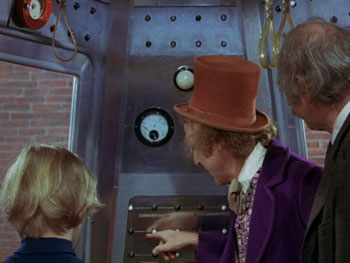What tech-utopianists posit is a world where institutions that were organized during the industrial age get re-structured for the information age.
Such a fundamental shift tickles the imagination. Pick any industry, cultural norm, social activity and re-imagine how it would function when the cost of sharing information is negligible and you have the ability to find like-minded people instantly. With the “internet of things” it is very much at your fingertips.

At its best, innovation expressed through entrepreneurship is a form of cultural critique. They are projects that take us one step closer to the new structure of institutions.
I like to think this is what I did with Spot.Us and doing with Circa.*
An entrepreneur in this way is a kind of renaissance person. They aren’t just building a company or website (or chocolate factory), they are making a statement about the world and we should hope it’s a refined, informed and well rounded statement. All code is political, all platforms define something about the purpose of the content it creates.

This is why, when Zuckerberg says anything about privacy, even in passing, people take pause. We intrinsically know that as much as Facebook is a company, it is also a critique, a kind of statement about how things should be according to its engineers. Zuckerberg has control of the elevator and can push any button to take it in any direction he wants.

I think BitCoin may be the greatest technological critique of 2013. It is the Napster of capitalism. Even if it does not succeed – the genie is out of the bag. The critique has been made and understood. Society takes a step forward.
Of course for every utopia there is a dystopia.

Technology companies in this view are a result of a bubbled industry. They rely on a temporal advantage of having knowledge of a relatively obscure skill (coding) to produce simple services. What do they do with this position of power?
I have seen the best of my generation spend their energy trying to create the next Angry Birds.
Haters gonna hate, right? Well, I say kudos to those who are successful. To the creator of Dots, my hat is off (and please send me $20, I know you can afford it). But you cannot in good conscious turn around and hold the position that you’ve made a contribution to society. At best you’ve entertained people. But we have no shortage of entertainment and Dots doesn’t push the boundary anymore than Tetris did in 1984.
Too many startups aren’t interested in really pushing boundaries so much as a quick exit and there are few checks against their ability to do this. There is little passion or aim. And technologists wonders why there is a class clash happening in San Francisco.

Now I don’t want to be the judge of what startups are making a cultural critique and which are utterly pointless. We get into gray territory when we examine the copycat startups (We are X for Y: i.e.: “We are Uber for dry cleaning!”) where it’s debatable if they are critiquing an institution – or just shipping code quickly to corner a market. I’d argue it’s often the latter – but the point of this post is not to point fingers but to think through a general dividing issue.
What is the value of entrepreneurship and the San Francisco culture where it is seemingly bred? Are we the sages, the explorers going out ahead of the rest trying new and interesting things, leaving signs along our trail for the rest of society to follow? Are we “the music makers and we are the dreamer of dreams”? Or are we merely the pillagers, gun-slingers making our own rules until civilization catches up? What we undertake could be the “egregious exploitation of technology and individual’s hopes for a better world for the sake of personal financial gain.” (credit)

—–30—-
*Spot.us was partly a comment to the larger journalism community. A way to say: Hey, let’s fundamentally re-think the flow of money in our industry. Here’s what it looks like if we make it more transparent and more participatory. Discuss…..
Circa is making a different kind of critique: Hey, what happens when we re-think assumptions about “articles” as the default and finite container for news. Discuss…..
2 thoughts on “The pull of technology, the push of entrepreneurship – using Willy Wonka as a metaphor”